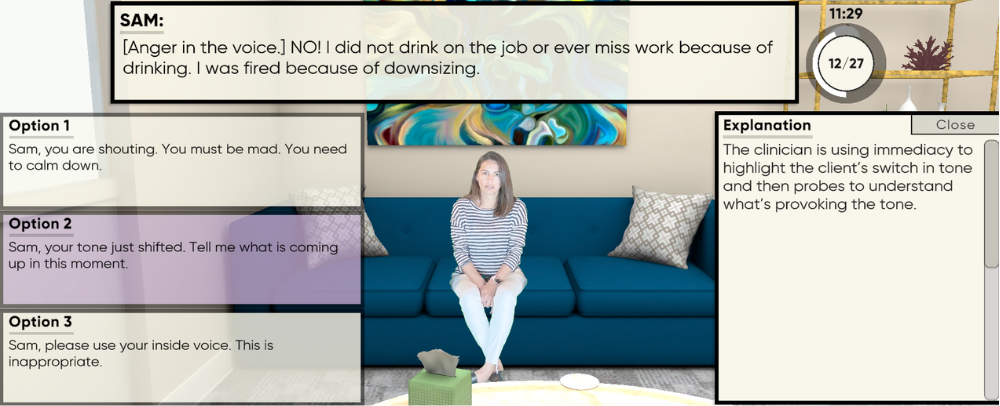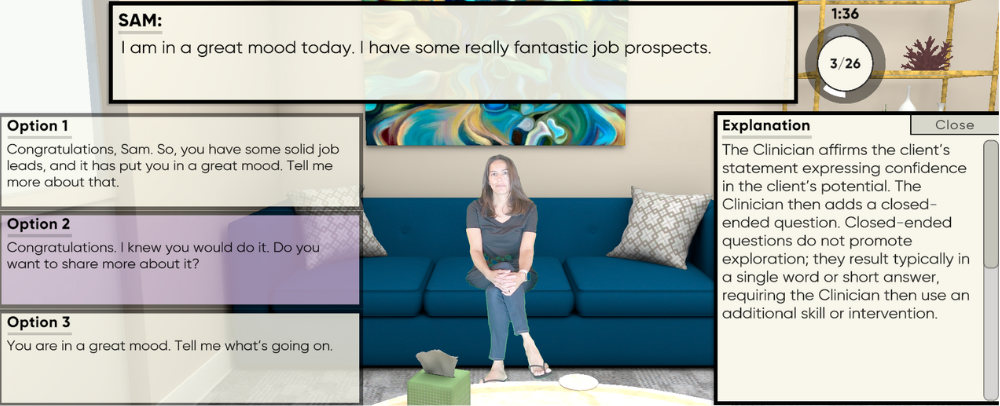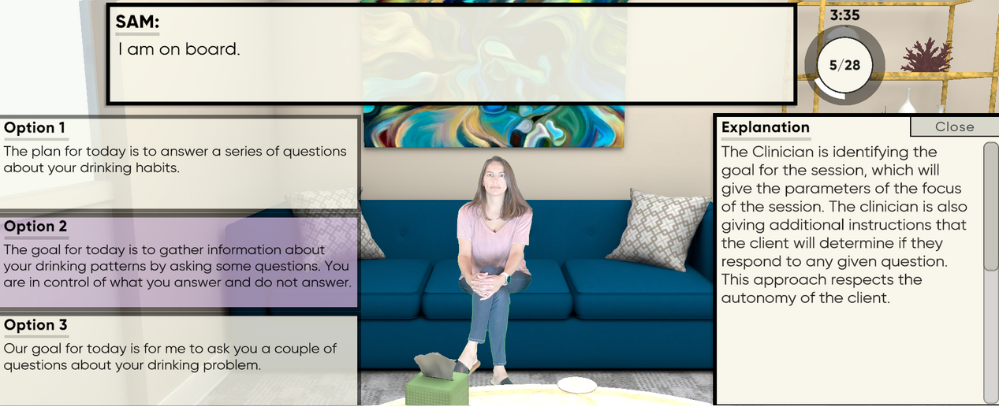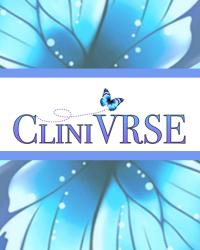CLINIVRSE: CLINIcal Virtual Reality Simulated Education: Anxiety Driven Conflict Avoidance: Sessions 1-10
Author(s): Earl Grey , APRIL R. CRABLE
Edition: 1
Copyright: 2023
Website
$175.00 USD
CliniVRSE is ASYNCHRONOUS virtual reality technology that develops learners' expansive command of their clinical skills & decision-making while providing them with live feedback.
CliniVRSE:
- Fills the Gap in Asynchronous Skill Development
- Teaches learners to make clinical decisions, moment to moment, in a counseling session
- Includes 10 full clinical session for learners to practice identify micro-skills
- Allows users to work with the same client seeking treatment for conflict avoidance over 10 Sessions
- Fosters clinical decision making skills
- Supports educators and supervisors assessment of a learner/supervisee's skill development
- Is auto-graded to save on faculty time
- 1 full session saves an estimated 5+ hours of live teaching/coaching and grading/evaluation (that is 50 hours per learner/supervisee SAVED)
- Learners can review and practice sessions to improve their clinical decision making and micro-skill identification multiple times.
- Learners receive feedback on every statement they select in practice mode.
- Learners can use practice mode for knowledge acquisition or Test mode to have the session auto graded.
- Programs can use the sessions as pre/post-test evaluation to support outcomes reporting with little to no additional synchronous time
- Supports educators and supervisors in synchronous hours for training and teaching
See the accompanying handbook for clinical experiential learning!
Want to learn how CliniVRSE works? Check out the videos below!



Earl Grey has, over the past 25 years, held positions as a clinician, supervisor, and administrator in community mental health and addiction agencies, in addition to faculty, coordinator, director, and dean in digital counseling programs. Dr. Grey’s expertise includes regulatory accountability, academic administration, and experiential education across disciplines, complex trauma, dissociation, anti-racism, and neuroscience.
April Crable, Ph.D., MBA, LPC, SOTP, BC-TMH, received her B.A. in Criminal Justice from Old Dominion University, received her MBA from the University of Phoenix, and received her M.A. in Professional Counseling and Ph.D. in Counselor Education and Supervision from Regent University. Recently, Dr. Crable was selected as the Clinical Director of Practicum and Internship at Liberty University. Dr. Crable has worked in mental health for almost two decades, providing services to various populations. She has been a counselor educator for over a decade.
April Crable, Ph.D., MBA, LPC, SOTP, BC-TMH, received her B.A. in Criminal Justice from Old Dominion University, received her MBA from the University of Phoenix, and received her M.A. in Professional Counseling and Ph.D. in Counselor Education and Supervision from Regent University. Recently, Dr. Crable was selected as the Clinical Director of Practicum and Internship at Liberty University. Dr. Crable has worked in mental health for almost two decades, providing services to various populations. She has been a counselor educator for over a decade.
Dr. Crable is the owner of CCCDW, LLC which provides customized consulting recommendations and training designed to maximize the performance of individuals and organizations. She is the published author of several books and peer-reviewed articles in counseling journals. Dr. Crable has presented on the state, national, and international levels. She is also the co-founder of CliniVRSE, a virtual reality technology that develops learners’ expansive command of their clinical skills and decision-making while providing them with invivo feedback. Dr. Crable is an appointed member of CACREP’s Anti-Racism & Anti-Oppression Council and a professional reviewer for the Texas State Board of Examiners of Professional Counselors. She serves as an editor for Therapeutic Speakeasy Quarterly, a peer-reviewed eJournal. Dr. Crable specializes in teletherapy, crisis and trauma and counseling, substance abuse, ethics, and sex offender treatment.
See all reviews on the CliniVRSE Testimonials Page: https://www.cccdwllc.com/clinivrse
This is so infatuating!! As a professor, I truly value the idea of having 10 sessions so that students can follow through with a client and see what it is like to do a full session. Most students don’t have experience prior to coming into a counseling program, and don’t get opportunities to try their skills out until practicum/internship. As I teach counseling skills online, we do mock sessions in class, and over the course of a semester, they do three video recordings of mock counseling sessions, lasting only about 20 minutes. That doesn’t give them much practice, but it merely grazes the surface.
With this experience, counseling programs can be enhanced. Using this tool along with F2F instruction and field-experience has the potential to enhance the quality of counselors being trained in online-programs. This could also be beneficial for Residential learning as well.
Caitlyn Ybarra, PhD, LPC-S (VA), NCC, LPC (MO), BC-TMH
Assistant Professor of Counseling
In contemporary times with multiple aspects of academia and professional development grounded in the use of technology, CliniVRSE presents as a teaching and learning tool that fills the gap between mock sessions during core counseling courses and the practicum/internship experiences. Prior to navigating the technology, I viewed the Author YouTube Interview of Dr. April R. Crable and Dr. Earl Grey to gain initial insight of the creators’ intentions. Afterwards, I accessed CliniVRSE and found it to be a well-designed virtual reality technology relevant for clinical professions with an area of needed enhancement focusing on accessibility for the range of visual differences. After follow-up with CliniVRSE creators, it was learned that this accessibility and inclusion enhancement is currently in process. Overall, my reactions and insights pertaining to this asynchronous technology are expressed below.
As both a social work and counselor educator, I see the value of implementing CliniVRSE to immerse the student in the intricacies of the counseling experience prior to implementing their course learning at a field agency site. CliniVRSE allows for immediate processing of the impact of responses upon clients and allows the opportunity for self-reflection, evaluation, corrective processes, and the practice of skills that both include and extend beyond the one-to-one clinical settings, thus implementing a generalist approach. Further, it enhances students’ familiarity with being present during a 50-minute session, in vivo clinical decision making, and opportunity to assess readiness prior to clinical placement.
The 10 modules allow counselors-in-training to experience the client from an initial session through termination. Throughout these sessions, the student is exposed to various experiences that may occur in practice such as responding to missed appointments, realizing the critical differences between closed and open-ended questions, enhancing awareness of communicating context in responses to clients, promoting self-awareness of language used (e.g., colloquialisms) during sessions and the impact on clients. Overall, CliniVRSE highlights multiple nuances that can take place during the counseling relationship. This is a great opportunity for students to learn at their own pace and enhance their preparation skills prior to field work. The flow of CliniVRSE also reflects a similarity to in vivo supervision. For example, after selecting a response, the student receives feedback. This further compels the opportunity for self-reflection and skill enhancement.
As a university professor, CliniVRSE allows opportunities for self-reflective projects and student-student interaction in the distance or traditional learning environments. For example, via discussion forums students may have the opportunity to share their experiences in engaging with the CliniVRSE client, complete a reflection paper, video, or audio recording with guiding prompts about their growth experiences from session one through session ten, or even engage in the completion of an instructor-developed self-evaluation tool pertaining to the specific skills practiced using CliniVRSE in alignment with the course objectives and CACREP standards. There are multiple ways this content can be implemented into clinical courses to strengthen students' understanding of the skills and the practical application prior to field experiences.
Reviewed February 29, 2024 by:
Dr. Veronica L. Hardy, LCSW, NCC
Counselor Educator
Clinical Mental Health Counseling Program
Saint Joseph’s University
Philadelphia, PA
CliniVRSE is ASYNCHRONOUS virtual reality technology that develops learners' expansive command of their clinical skills & decision-making while providing them with live feedback.
CliniVRSE:
- Fills the Gap in Asynchronous Skill Development
- Teaches learners to make clinical decisions, moment to moment, in a counseling session
- Includes 10 full clinical session for learners to practice identify micro-skills
- Allows users to work with the same client seeking treatment for conflict avoidance over 10 Sessions
- Fosters clinical decision making skills
- Supports educators and supervisors assessment of a learner/supervisee's skill development
- Is auto-graded to save on faculty time
- 1 full session saves an estimated 5+ hours of live teaching/coaching and grading/evaluation (that is 50 hours per learner/supervisee SAVED)
- Learners can review and practice sessions to improve their clinical decision making and micro-skill identification multiple times.
- Learners receive feedback on every statement they select in practice mode.
- Learners can use practice mode for knowledge acquisition or Test mode to have the session auto graded.
- Programs can use the sessions as pre/post-test evaluation to support outcomes reporting with little to no additional synchronous time
- Supports educators and supervisors in synchronous hours for training and teaching
See the accompanying handbook for clinical experiential learning!
Want to learn how CliniVRSE works? Check out the videos below!



Earl Grey has, over the past 25 years, held positions as a clinician, supervisor, and administrator in community mental health and addiction agencies, in addition to faculty, coordinator, director, and dean in digital counseling programs. Dr. Grey’s expertise includes regulatory accountability, academic administration, and experiential education across disciplines, complex trauma, dissociation, anti-racism, and neuroscience.
April Crable, Ph.D., MBA, LPC, SOTP, BC-TMH, received her B.A. in Criminal Justice from Old Dominion University, received her MBA from the University of Phoenix, and received her M.A. in Professional Counseling and Ph.D. in Counselor Education and Supervision from Regent University. Recently, Dr. Crable was selected as the Clinical Director of Practicum and Internship at Liberty University. Dr. Crable has worked in mental health for almost two decades, providing services to various populations. She has been a counselor educator for over a decade.
April Crable, Ph.D., MBA, LPC, SOTP, BC-TMH, received her B.A. in Criminal Justice from Old Dominion University, received her MBA from the University of Phoenix, and received her M.A. in Professional Counseling and Ph.D. in Counselor Education and Supervision from Regent University. Recently, Dr. Crable was selected as the Clinical Director of Practicum and Internship at Liberty University. Dr. Crable has worked in mental health for almost two decades, providing services to various populations. She has been a counselor educator for over a decade.
Dr. Crable is the owner of CCCDW, LLC which provides customized consulting recommendations and training designed to maximize the performance of individuals and organizations. She is the published author of several books and peer-reviewed articles in counseling journals. Dr. Crable has presented on the state, national, and international levels. She is also the co-founder of CliniVRSE, a virtual reality technology that develops learners’ expansive command of their clinical skills and decision-making while providing them with invivo feedback. Dr. Crable is an appointed member of CACREP’s Anti-Racism & Anti-Oppression Council and a professional reviewer for the Texas State Board of Examiners of Professional Counselors. She serves as an editor for Therapeutic Speakeasy Quarterly, a peer-reviewed eJournal. Dr. Crable specializes in teletherapy, crisis and trauma and counseling, substance abuse, ethics, and sex offender treatment.
See all reviews on the CliniVRSE Testimonials Page: https://www.cccdwllc.com/clinivrse
This is so infatuating!! As a professor, I truly value the idea of having 10 sessions so that students can follow through with a client and see what it is like to do a full session. Most students don’t have experience prior to coming into a counseling program, and don’t get opportunities to try their skills out until practicum/internship. As I teach counseling skills online, we do mock sessions in class, and over the course of a semester, they do three video recordings of mock counseling sessions, lasting only about 20 minutes. That doesn’t give them much practice, but it merely grazes the surface.
With this experience, counseling programs can be enhanced. Using this tool along with F2F instruction and field-experience has the potential to enhance the quality of counselors being trained in online-programs. This could also be beneficial for Residential learning as well.
Caitlyn Ybarra, PhD, LPC-S (VA), NCC, LPC (MO), BC-TMH
Assistant Professor of Counseling
In contemporary times with multiple aspects of academia and professional development grounded in the use of technology, CliniVRSE presents as a teaching and learning tool that fills the gap between mock sessions during core counseling courses and the practicum/internship experiences. Prior to navigating the technology, I viewed the Author YouTube Interview of Dr. April R. Crable and Dr. Earl Grey to gain initial insight of the creators’ intentions. Afterwards, I accessed CliniVRSE and found it to be a well-designed virtual reality technology relevant for clinical professions with an area of needed enhancement focusing on accessibility for the range of visual differences. After follow-up with CliniVRSE creators, it was learned that this accessibility and inclusion enhancement is currently in process. Overall, my reactions and insights pertaining to this asynchronous technology are expressed below.
As both a social work and counselor educator, I see the value of implementing CliniVRSE to immerse the student in the intricacies of the counseling experience prior to implementing their course learning at a field agency site. CliniVRSE allows for immediate processing of the impact of responses upon clients and allows the opportunity for self-reflection, evaluation, corrective processes, and the practice of skills that both include and extend beyond the one-to-one clinical settings, thus implementing a generalist approach. Further, it enhances students’ familiarity with being present during a 50-minute session, in vivo clinical decision making, and opportunity to assess readiness prior to clinical placement.
The 10 modules allow counselors-in-training to experience the client from an initial session through termination. Throughout these sessions, the student is exposed to various experiences that may occur in practice such as responding to missed appointments, realizing the critical differences between closed and open-ended questions, enhancing awareness of communicating context in responses to clients, promoting self-awareness of language used (e.g., colloquialisms) during sessions and the impact on clients. Overall, CliniVRSE highlights multiple nuances that can take place during the counseling relationship. This is a great opportunity for students to learn at their own pace and enhance their preparation skills prior to field work. The flow of CliniVRSE also reflects a similarity to in vivo supervision. For example, after selecting a response, the student receives feedback. This further compels the opportunity for self-reflection and skill enhancement.
As a university professor, CliniVRSE allows opportunities for self-reflective projects and student-student interaction in the distance or traditional learning environments. For example, via discussion forums students may have the opportunity to share their experiences in engaging with the CliniVRSE client, complete a reflection paper, video, or audio recording with guiding prompts about their growth experiences from session one through session ten, or even engage in the completion of an instructor-developed self-evaluation tool pertaining to the specific skills practiced using CliniVRSE in alignment with the course objectives and CACREP standards. There are multiple ways this content can be implemented into clinical courses to strengthen students' understanding of the skills and the practical application prior to field experiences.
Reviewed February 29, 2024 by:
Dr. Veronica L. Hardy, LCSW, NCC
Counselor Educator
Clinical Mental Health Counseling Program
Saint Joseph’s University
Philadelphia, PA

